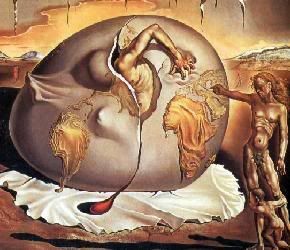This has turned out to be a rather more complicated question than I expected; I jumped in simply to point out things I thought everyone recognized but had forgotten in the heat of a dispute, but it turns out no one agrees with me.
Jonathan Prejean (the Crimson Catholic) has responded to my
post on his prior post about the authority of Scripture. He suggests this line of reasoning:
What this essentially says is that there must be someone to speak with the very same force of law in favor or against some interpretation. Absent that, one simply must concede that the law has no authority over the dispute. One appeals vainly to a law that has no force, and on that account, is no law. One might form all manner of probable opinions, but none are ever binding.
But this, I think, doesn't get us anywhere; everyone agrees that there is someone to speak with binding force in favor or against some interpretation, namely, the Holy Spirit. Protestants don't disagree with Catholics up to this point. Jonathan wants to say that "If the Scriptures are the SOLE rule of faith and morals, so as to exclude any human agency endowed with the capacity to speak authoritatively in the name of God (which entails infallibility) in giving interpretations, then the Scriptures cannot be a law." But this appears to be false, taken strictly; if God Himself speaks authoritatively in the name of God, then you don't
need any human agency endowed with the capacity to speak authoritatively -- God is authoritative enough. And there's no real way of getting around this: any Protestant worth his salt will point out to Jonathan that there's nothing human authority can
add to divine authority. And this is the Catholic view, too, as far as I can see. The only question is whether God decides to speak authoritatively through the medium of human agency.
Where Protestants and Catholics disagree is in their full accounts of the authority of Scripture, because, as Jonathan and Father Kimel and others keep pointing out (but I think they keep confusing this with other, distinct issues), from the Catholic point of view the Protestant account of the authority of Scripture is incomplete. Another way to put it, as I've put it before, is that from the Catholic perspective Protestants have only a partial understanding of the work of the Holy Spirit in Scripture.
Now, Jonathan, borrowing from Scott, argues that "we have no reason on earth to think that any individual has 'words engraved on the heart' in any publicly binding fashion." Of course, to some degree this depends on what we mean by 'publically binding'. For instance, it's not impossible to have authoritative and binding words engraved on the heart; this is the Catholic view of conscience. Is conscience 'publically binding'? It's publically binding enough that it will be taken into account before God's great judgment seat. But what of the case of Scripture? In fact, the 'publically' does not enter into question here. Binding force is binding force; and for this all that is required is the witness of the one with the authority -- and this is the Holy Spirit. Scripture does not get its binding force from the Church, but from God; and this, too is the Catholic view. The Church proclaims and does not create the authority of Scripture. The authority of the Church is an extension of the same authority exhibited in the authority of Scripture, namely, the authority of the Holy Spirit. Thus when Jonathan says:
Laws without courts are powerless to adjudicate interpretive disputes, so they are no laws over those disputes at all. You yourself cited Nicaea. Why? That was a disputed interpretation of Scripture, and there is no authority who can speak with the same legal force as Scriptures so as to bind the interpretation of Scripture.
The obvious, and conciliar, response is that there is an authority who can speak with the same "legal force" (if we prefer to talk about Scriptural authority by analogy to law), namely, God. Thus, if, in fact, as Catholics do indeed accept, the Holy Spirit spoke definitively through the Council of Nicaea, that in and of itself makes the words of Nicaea authoritative. And this, taken as a hypothetical, any Protestant will accept, whatever their view of the councils. Likewise, if the Holy Spirit speaks through Scripture, that in and of itself makes Scripture authoritative. And this
general principle everyone accepts. The disagreement, as I've repeatedly stated, is about the ways in which the Holy Spirit actually works. To
deny that God is an authoritative, and relevant, interpreter of Scripture is not a serious option, since all authority -- whether of Scripture itself or of the Church in interpreting it -- is a derivative authority, a participation in the authority of the Holy Spirit who works to preserve the Church in truth. To say that the Church is 'endowed' with the authority to interpret is simply to say that the Holy Spirit moves in the Church to interpret. In a dispute over differing interpretations, then, the recourse is to the Holy Spirit. Here Protestant and Catholic diverge with different accounts of how this recourse is possible.
This is the question that divides Catholic and Protestant on the question of Scripture. Anything else is a red herring. And it is at
this point that the Catholic must regard the Protestant account as incomplete (and thus deficient to the extent that it tries to present itself as complete). But, note, this is a different question from that of the authority of Scripture, a different question from that of the existence of a plain sense of Scripture, a different question from that of the danger of private judgment.
In responding to my point about the authority of Scripture in Catholic private devotion, Jonathan says:
The first sentence in the quote above simply equivocates on what "authoritative" means. I imagine that he does not think that his interpretation is binding on every Catholic who reads Scripture, any more than I think that my judgment of the law means that my opponent is thereby bound to agree with me, even though I have no authority. I might well think that my opinion is "authoritative" in that I have a very real belief that a reasonable judge will agree with me, viz., that I have persuasive authority, but that is not the same thing. The point is that no interpretation, no matter how persuasive, can possibly be binding absent the direct intervention of an authoritative interpreter; collective wisdom cannot add up to a binding authority. The individual Catholic simply cannot make public law for the Church; the Magisterium can. And my problem is that if there cannot even possibly be the direct intervention of an authoritative interpreter, then I have no idea what it means for the Scriptures to serve as law, canon, or rule, since those rare cases are the ones separating the rule of law from anarchy.
But it is Jonathan who is equivocating; I talked of the authority of Scripture, which remains even in circumstances where interpretations have no authority except insofar as they correctly express Scriptural truth, whereas he talks of the authority of interpretations themselves. And this has been the common move: Protestants insist on the authority of Scripture, and Catholics deny that private interpretations of Scripture have any authority. It is an irrelevant move. Of course, no Protestant will agree that "there cannot even possibly be the direct intervention of an authoritative interpreter": he or she will say that there certainly an intervening authoritative interpreter, the Holy Spirit. And this is the same authoritative interpreter on which Catholics rely, because the Magisterium has all of its authority wholly in its participation in the teaching authority of the Holy Spirit. There is no other authority of any significance in this matter. The reasonable Catholic argument against Protestants is not that Protestants have no grounds on which to accept the authority of
Scripture, but that they fail to appreciate the full authoritative work of the
Holy Spirit.
In any case, I think that there's a danger in a number of Jonathan's expressions, namely an assimilation of all authority in the Church to something like canon law, whereas canon law is simply one of many different expressions of the Church's authority. And this is not surprising. When Jesus tells a parable, that is not a law; but it is an authoritative expression of truth, because it is put forward by the teaching authority of Jesus himself. And this is perhaps where Jonathan is going wrong; he thinks of authority in terms of the binding force of law, but the Catholic conception of the authority of Scripture and of the Church has always been primarily expounded in terms of authoritative teaching, and even the binding force of canon law is
derivative of this more fundamental form of authority. Authority lies with the Teacher; the judge has no authority except insofar as he is a very specialized kind of teacher with a very particular authority to teach. And thus to think of the Church's authority, or Scripture's authority, or the Holy Spirit's authority, wholly in terms of juridical authority is to fail to go back to first principles.
And a further problem is that Jonathan treats his argument is a defense of the juridical authority of Scripture; but in fact it seems to entail that Scripture has no juridical authority -- only the pronouncements of the Church have authority, because only they can be "identified with human interpretive acts," in Jonathan's words. This is not, I think, the Catholic view of the authority of Scripture. Scripture is the rule of faith because it is from God, and it is because it is from God that it is received by the Church as the rule of faith; it is false to say that there is "no authority of Scripture as canon, rule, or law" without the interpretive act of the Holy Spirit "being actually identified with human interpretive acts." The authority of Scripture is the authority of divine pedagogy; the Church has authority to interpret it because Scripture is given to the Church as a trust to guard and to proclaim, and this authority consists in its being led by the same Spirit of truth whose authoritative teaching is also expressed in Scripture. Any juridical aspect of authority, both of the Church and of Scripture, is explained by this as well.
Scott Carson had also commented on my previous post; I don't really have much to say to it, it largely just shows that Scott and I both think (1) that the other has completely misdiagnosed the state of the dispute between Catholics and Protestants and (2) that the Catholic line of argument that the other thinks carries the most force against the Protestant view of Scripture is in reality completely irrelevant to it. In any case, you should read it, too. He also comments
here on the discussion I've been having with Fr. Kimel in the comments to that post, mostly on the subject of the canon. As I noted to Fr. Kimel, plain sense in the basic form is hardly 'useless to the Protestant position' if that means it is useless to Protestant polemics; it's a standard polemical tactic -- and one reason I jumped into this discussion is that it seemed to me the Catholics in the discussion were doing the same thing in reverse with the arguments about private judgment -- to associate one's own position with an obviously undeniable claim and one's opponents' position with the denial of that obviously undeniable claim. It is, of course, a question open to genuine argument whether other positions held by the other side actually do imply the denial of that claim. But in this context this is an argument that there is a hidden inconsistency in the other side's position; such arguments take very close and accurate examination of that position. In any case, the question of the plain meaning of Scripture is definitely distinct from questions of authority; it's relevant to interpretation, of course, but only to the sort of interpretation we find in the prayerful reading of Scripture in private devotion. On the issue of the canon, I don't think there's any disagreement, although I interpret the Dei Verbum passage differently:
These books the church holds to be sacred and canonical not because she subsequently approved them by her authority after they had been composed by unaided human skill, nor simply because they contain revelation without error, but because, being written under the inspiration of the holy Spirit, they have God as their author, and were as such committed to the church.
I don't think this does identify three reasons why a text is accepted as canon; I think it identifies only one. It does not identify subsequent approval by authority as one of them, because when it mentions that it is talking about "after they had been composed by unaided human skill". This is clearly a counterfactual scenario: the idea is that the Church does not hold the canon to be sacred on the basis of the Church using its authority to approve a bunch of texts that were not inspired. It then also denies that the Church holds the text sacred and canonical simply because they contain revelation without error. Rather, the real reason the Church holds them sacred and canonical is that they have God as their author and were committed to the Church as having God as their author. Thus, I think the document does, indeed, deny Scott's [1] and [2] as reasons for the canon. Of course, it's true that the Church subsequently approved the texts, and it's true that they contain revelation without error, but these are not why these are
canonical texts. The reason they are canonical is that they have God as their author and were committed to the Church as such. So I've been interpreting the passage.


